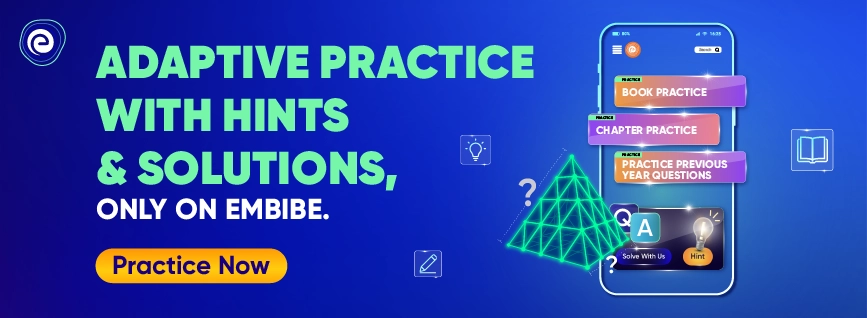- Written by gnanambigai
- Last Modified on 10-12-2024
About Assam Board Class 8 Exam 2025
The Board of Secondary Education, Assam, or SEBA, is the state education regulatory board under the Ministry of Education, Government of Assam. It is the governing body for higher secondary (10+2 stage) education in Assam. However, it also oversees the Class 8 exams and is established to regulate, supervise, and develop the state’s education system.
The Axom Sarba Siksha Abhiyan (SSA) conducts the examination for Class 8 students every year. Students must have a minimum of 75% attendance to be eligible for Assam Board Class 8 Exams. Also, SEBA provides the syllabus structure at the start of the academic session to help students succeed in the examinations. Students are evaluated based on their scores in subjects like English, Hindi, Mathematics, etc. Scroll down to read more about the Assam Board Class 8 Exam 2025.
Assam Board Class 8 Exam Summary 2025
Assam Board provides the syllabus structure to the students before the exams. Students need to understand the syllabus and marking scheme to prepare a study plan accordingly. The Assam Board Class 8 exams are conducted every year by the school authorities themselves. Therefore, students can refer to Embibe’s study materials to prepare for the exams.
A brief description of the Assam Board Class 8 Exam is tabulated below:
| Particulars |
Details |
| Board |
Board of Secondary Education, Assam (SEBA) |
| Commonly Known As |
SEBA |
| Formation |
January 29, 1962 |
| Headquarters |
Guwahati, Assam, India |
| Exam Conducting Body |
High School Leaving Certification Examination (HSLC) |
| Frequency of Exams |
Once in a year |
| Mode of Exam |
Offline |
| Total Marks of Exam |
100 |
Assam Board Official Website Link
https://sebaonline.org/
Assam Board Class 8 Exam Syllabus 2025
Students must carefully go through the Assam Board Class 8 Exam syllabus listed below to strategise their preparation. The Assam Board Class 8 syllabus is provided well in advance to help students with their studies. They can list down the important topics and start preparing accordingly. Now, let us look at the detailed exam syllabus provided below:
Assam Board Class 8 Science Syllabus
Science is one of the exciting subjects we study. In this subject, we learn about food, materials, the living world, and much more. The Science syllabus is prepared in such a way that helps students understand the topics with ease. Below we have provided the Assam Board Class 8 Science syllabus:
| Chapter No. |
Chapter Name |
| 1. |
Crop Production and Management |
| 2. |
Microorganism: Friend and Foe |
| 3. |
Synthetic Fibers and Plastics |
| 4. |
Materials: Metals and Non-Metals |
| 5. |
Coal and Petroleum |
| 6. |
Combustion and Flame |
| 7. |
Conservation of Plants and Animals |
| 8. |
Cell-Structure and Function |
| 9. |
Reproduction in Animals |
| 10. |
Contents Reaching the Age of Adolescence |
| 11. |
Force and Pressure |
| 12. |
Friction |
| 13. |
Sound |
| 14. |
Chemical Effects of Electric Current |
| 15. |
Some Natural Phenomena |
| 16. |
Light |
| 17. |
Stars and the Solar System |
| 18. |
Pollution of Air and Water |
Assam Board Class 8 Mathematics Syllabus
Mathematics is one of the subjects which plays a major role in day-to-day life, from calculating the price of vegetables to calculating gravity on the moon’s surface. Students must carefully go through the syllabus to ace the exams. Below is the Assam Board Class 8 Mathematics syllabus:
| Chapter No. |
Chapter Name |
| 1. |
Rational Numbers |
| 2. |
Linear Equations in One Variable |
| 3. |
Understanding Quadrilaterals |
| 4. |
Practical Geometry |
| 5. |
Data Handling |
| 6. |
Squares and Square Roots |
| 7. |
Cubes and Cube Roots |
| 8. |
Comparing Quantities |
| 9. |
Algebraic Expressions and Identities |
| 10. |
Visualising Solid Shapes |
| 11. |
Mensuration |
| 12. |
Exponents and Powers |
| 13. |
Direct and Inverse Proportions |
| 14. |
Factorisation |
| 15. |
Introduction to Graphs |
| 16. |
Playing with Numbers |
Assam Board Class 8 English Syllabus
English is a mandatory subject in Assam Board, therefore students must take the subject seriously to get good grades. When students have a clear understanding of the English syllabus, they can prepare more effectively and write with confidence. Check the table below to familiarise with the Assam Board Class 8 English syllabus:
| Chapter No. |
Chapter Name |
| 1. |
The Prince of Panidihing |
| 2. |
My Native Land |
| 3. |
Explore India: Quiz Time |
| 4. |
Dokchory Learns about Panchayat |
| 5. |
Louis Pasteur |
| 6. |
A New Day, A New Way |
| 7. |
Sympathy |
| 8. |
Chandraprabha Saikiani |
Assam Board Class 8 Social Science Syllabus
Social Science tells students about our history, culture, laws, and how we should use all the resources to get a better life. Social Science is further divided into three parts: History, Civics and Geography. Below is the Assam Board Class 8 Social Science syllabus:
Assam Board Class 8 Civics Syllabus
Students must refer to the Assam Board Class 8 Civics syllabus to know all about the important topics from an exam point of view. Check the table below to know more:
| Unit No. and Name |
Chapter Name |
| Unit 1: The Indian Constitution and Secularism |
The Indian Constitution
Understanding Secularism |
| Unit 2: Parliament and The Making of Laws |
Why do we need a Parliament?
Understanding Laws |
| Unit 3: The Judiciary |
Judiciary
Understanding Our Criminal Justice System |
| Unit 4: Social Justice and The Marginalised |
Understanding Marginalisation
Confronting Marginalisation |
| Unit 5: Economic Presence of the Government |
Public Facilities
Law and Social Justice |
Assam Board Class 8 History Syllabus
History is one of the most interesting subjects to read. It tells about human civilisation, and how humans have progressed from the ancient era to modern times. Below we have provided the History syllabus:
| Chapter Number |
Chapter Name |
| 1. |
How, When and Where |
| 2. |
From Trade to Territory The Company Establishes Power |
| 3. |
Ruling the Countryside |
| 4. |
Tribals, Dikus and the Vision of a Golden Age |
| 5. |
When People Rebel 1857 and After |
| 6. |
Weavers, Iron Smelters and Factory Owners |
| 7. |
Civilising the “Native”, Educating the Nation |
| 8. |
Women, Caste and Reform |
| 9. |
The Making of the National Movement: 1870s – 1947 |
| 10. |
India After Independence |
Assam Board Class 8 Geography Syllabus
Geography tells about the resources and the best way to sustain development. Students tend to develop an interest towards this subject as they study all about it. Now, let us check the Assam Board Class 8 Geography syllabus:
| Chapter No. |
Chapter Name |
| 1. |
Resources |
| 2. |
Land, Soil, Water, Natural Vegetation and Wildlife Resources |
| 3. |
Mineral and Power Resources |
| 4. |
Agriculture |
| 5. |
Industries |
| 6. |
Human Resources |
Study Plan to Maximise Score in Assam Board Class 8 Exam 2025
A study plan is extremely important because it allows students to learn a lot of things. Students will be able to manage their time and eventually kick-start their preparation if they have a proper study plan in place. As a result, it is important that students begin their preparation by following the study plan.
Preparation Tips for Assam Board Class 8 Exam
Students can follow the preparation tips mentioned below to ace their exams and score excellent marks. They can also modify these tips according to their need.
- Students must start by preparing a study plan after going through the syllabus. Then they must make notes from every chapter to avoid missing specific details.
- Students must follow the timetable to cover the entire syllabus quickly and efficiently. The timetable allows students to plan their time wisely by prioritising the difficult and easy subjects. It also ensures that students do not miss any important chapters before the examinations.
- Students must clear their doubts before the exam to avoid any last-minute confusion. They should be proactive in finding solutions to their problem for efficient exam preparation.
- Students should start with the easier chapters and then work on the difficult ones. Studying topics based on their difficulty level will allow students to organise their time better and complete the syllabus in less time.
- Students should attempt mock tests before the exam to track their progress. Embibe offers mock tests to help students with their studies. Moreover, Embibe’s AI assistance provides personalised feedback to students, helping them score more.
- Students can practice questions on each subject at Embibe to enhance their knowledge. Embibe offers thousands of practice questions from several books.
- Students must refer to Embibe’s study materials to ace the exams with ease. Students can use study materials like interactive 3D videos, books, exemplars, and much more during group study to learn more.
- Outdoor physical activity is also necessary for effective retention. Walking, running, jumping, skipping, and biking are all physical activities that stimulate the brain to become more active.
Assam Board Class 8 Detailed Study Plan
A detailed study plan is the strategy to study all the subjects in the most effective way. Students have to prepare each subject keeping in mind how to approach it. For example, students need to solve sample problems and they cannot reply on memorising concepts. In this section, we have provided subject-wise detailed study plan for Assam Board Class 8 exam.
- Mathematics: To get good marks in Assam Board Class 8 Maths, students must solve as many sample questions as they can find. It will help them memorise the formulas, prevent making silly mistakes and learn how to cross-check their answers. Students can access practice problems and mock tests on the Embibe app for.
- Science: In Assam Board Class 8 Science, students will have to write to-the-point answers. They should also practice drawing diagrams with correct labelling. Students can watch Embibe’s 3D videos to understand the chapter concepts easily.
- Social Science: In Social Science, students will learn 3 different types of concepts – History, Civics and Geography. They need to provide key information in their answers like- historical dates, events, place, etc, and geographical locations, resources, etc.
You can also check:
FAQs on Assam Board Class 8 Exam 2025
We have provided some frequently asked questions regarding Assam Board Class 8 below:
Q: How many hours should one study in Assam Board Class 8?
Ans: One should study at least 6-7 hours per day to achieve good grades in Assam Board Class 8.
Q: Are there mock tests and practice questions available for the Assam Board Class 8 exam?
Ans: Yes, students can take practice questions and mock tests on Embibe. It also provides study material designed by subject matter experts who have sound knowledge.
Q: Can I study for the Assam Board Class 8 Science with the help of videos?
Ans: Yes, students can study for the Assam Board Class 8 Science with the help of videos. Embibe offers interactive 3D videos to help students understand the concepts in-depth.
Q: Why is Class 8 an important elementary standard in education?
Ans: Class 8 is an important standard in elementary education as the concepts taught in this class act as the foundation for higher classes.
Q: Which competitive exams Assam Board Class 8 students are eligible for?
Ans: Assam Board Class 8 students are eligible to appear for various competitive exams. They are as follows:
- International Science Olympiad (ISO)
- International Maths Olympiad (IMO)
- English International Olympiad (EIO)
- General Knowledge International Olympiad (GKIO)
- International Computer Olympiad (ICO)
- International Drawing Olympiad (IDO)
- National Essay Olympiad (NESO)
- National Social Studies Olympiad (NSSO) etc.
List of Assam Board Class 8 Educational Institutions
Primary (Lower and Upper Primary), Secondary, and Higher Secondary are the three main levels of education in Assam. The state’s primary-level schools are managed and governed by the “Directorate of Elementary Education” in various districts. Therefore, students can have a look at the list of those schools from the table below:
| List of Schools |
Location |
| Adarsha Vidyalaya, Mandia |
Mandia |
| Adarsha Vidyalaya |
Pakabetbari |
| Adarsha Vidyalaya |
Ganakuchi, Barpeta |
| Adarsha Vidyalaya |
Rangapather |
| Harisinga H.S. School |
Udalguri |
| Chandranath Sarma HS School |
Gabharu |
| Marowa Anandaram Barua High School |
Pub Nalbari |
| Jaluguti H.S. School |
Kapili |
| Bhuragaon H Sarkar HS School |
Laharighat |
| Govt. HS & MP School |
Kokrajhar |
| Ram CH Barman Public HSS |
Raja Bazar |
| Barpeta Govt. H.S.S. |
Barpeta |
| Janapriya HS School |
Ghugubari |
| Kayakuchi H S School |
Bhawanipur |
Future Exams After Assam Board Class 8
Students in Assam Board Class 8 can participate in a variety of competitive exams. The list of those exams have been mentioned below:
- Olympiads: The NCO, IMO, NSO, and ISO are only a few of the Olympiads that are run by the Science Olympiad Foundation (SOF). They are fiercely competitive and only occur once a year.
- NSTSE: Students in grades 1 through 12 can take the National Level Science Talent Search Exam, which is given by the Unified Council. The NSTSE is one of the scholarship exams that India holds most regularly.
- NIMO: The EduHeal Foundation runs a programme called the National Interactive Math Olympiad with the intention of making math more enjoyable. Events that encourage participation, such workshops, lectures, and competitions, will be used to achieve this.
- NBTO: The National Biotechnology Olympiad is a contest that increases public understanding of biotechnology while also introducing a competitive element. Additionally, it encourages the younger generation to better comprehend biotechnology-related concerns and gauge their suitability for potential careers in the field.
- Indian National Olympiad (INO): The Indian National Olympiads is a five-stage process that the Indian government funds financially. The first step of the Indian National Olympiad is the NSE (National Standard Examination) and is administered by the Indian Association of Physics Teachers (IAPT). The remaining four stages are administered by Homi Bhabha Centre for Science Education (HBCSE).
The five stages are:
Stage I: National Standard Examination (NSE)
Stage II: Indian National Olympiad
Stage III: Orientation cum Selection Camp (OCSC)
Stage IV: Pre-departure Training Camp (PDT)
Stage V: Participation in International Olympiad
Subjects: Physics, Chemistry, Biology, Astronomy and Junior Science
Conducting Body: Jointly conducted by Indian Association of Physics Teachers (IAPT) & Homi Bhabha Centre for Science Education (HBCSE)
- GeoGenius: Isn’t it odd that many students struggle to locate India on a global map? As a result, GeoGenius has embarked on a mission to stimulate student interest in geography while also increasing public awareness of the topic. Students in classes 2 to 12 are eligible to take these examinations. The Geography Olympiad, however, does not qualify you to compete in the International Geography Olympiad, which is organised separately.
- Silverzone Olympiads: The Silverzone Foundation is a non-profit organisation committed to increasing academic awareness among Indian and international students. Students studying in classes 1 to 12 can attempt this exam. It ensures that they excel not just professionally but also socially. These assessments also encourage problem-solving and creative thinking.
Subject: Computer, Mathematics, Science and English Language
Conducted by: Silverzone Foundation.
- Kishore Vigyan Protsahan Yojana or KVPY: For students in classes 11 and12I, the Department of Science and Technology administers a nationwide competitive exam in Basic Sciences. The selected applicants will be eligible for admission to the five-year integrated MS programme at the Indian Institute for Science Education and Research. The program’s objective is to identify students with a natural aptitude for research.
Conducted Body (funded by): Department of Science and Technology of the Government of India
- Asset (Assessment of Scholastic Skills Through Educational Initiatives): It’s a skill-based assessment exam that was developed scientifically to eliminate the concept of rote learning. It measures how well students have mastered the underlying school syllabus and is designed for students in classes 3-10. These exams are based on the CBSE, ICSE, IGCSE, and major state boards’ curriculum.
Subjects: English, Mathematics and Science (Social Studies and Hindi – Optional)
Conducting Body: Educational Initiatives Pvt. Ltd.














































